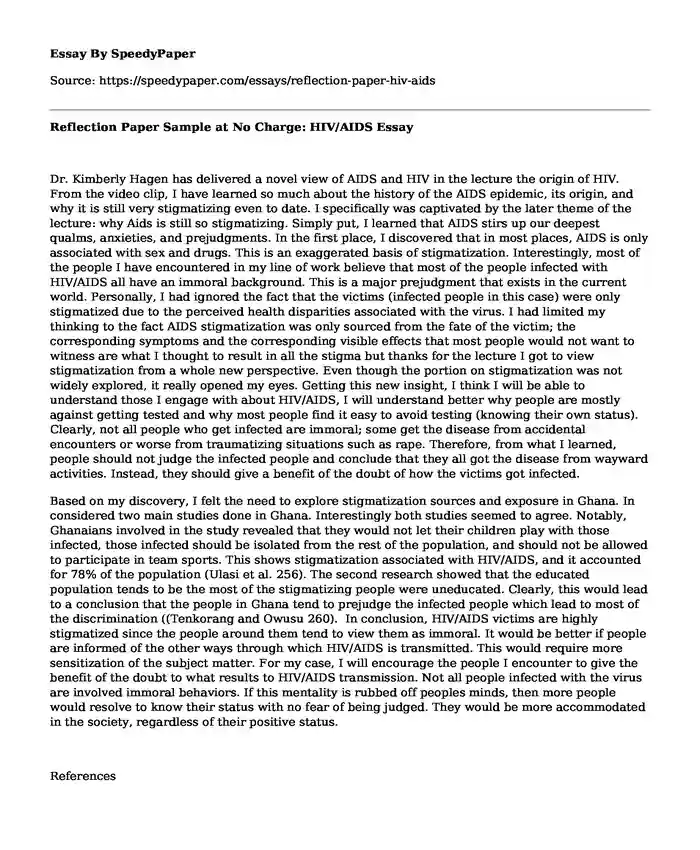Dr. Kimberly Hagen has delivered a novel view of AIDS and HIV in the lecture the origin of HIV. From the video clip, I have learned so much about the history of the AIDS epidemic, its origin, and why it is still very stigmatizing even to date. I specifically was captivated by the later theme of the lecture: why Aids is still so stigmatizing. Simply put, I learned that AIDS stirs up our deepest qualms, anxieties, and prejudgments. In the first place, I discovered that in most places, AIDS is only associated with sex and drugs. This is an exaggerated basis of stigmatization. Interestingly, most of the people I have encountered in my line of work believe that most of the people infected with HIV/AIDS all have an immoral background. This is a major prejudgment that exists in the current world. Personally, I had ignored the fact that the victims (infected people in this case) were only stigmatized due to the perceived health disparities associated with the virus. I had limited my thinking to the fact AIDS stigmatization was only sourced from the fate of the victim; the corresponding symptoms and the corresponding visible effects that most people would not want to witness are what I thought to result in all the stigma but thanks for the lecture I got to view stigmatization from a whole new perspective. Even though the portion on stigmatization was not widely explored, it really opened my eyes. Getting this new insight, I think I will be able to understand those I engage with about HIV/AIDS, I will understand better why people are mostly against getting tested and why most people find it easy to avoid testing (knowing their own status). Clearly, not all people who get infected are immoral; some get the disease from accidental encounters or worse from traumatizing situations such as rape. Therefore, from what I learned, people should not judge the infected people and conclude that they all got the disease from wayward activities. Instead, they should give a benefit of the doubt of how the victims got infected.
Based on my discovery, I felt the need to explore stigmatization sources and exposure in Ghana. In considered two main studies done in Ghana. Interestingly both studies seemed to agree. Notably, Ghanaians involved in the study revealed that they would not let their children play with those infected, those infected should be isolated from the rest of the population, and should not be allowed to participate in team sports. This shows stigmatization associated with HIV/AIDS, and it accounted for 78% of the population (Ulasi et al. 256). The second research showed that the educated population tends to be the most of the stigmatizing people were uneducated. Clearly, this would lead to a conclusion that the people in Ghana tend to prejudge the infected people which lead to most of the discrimination ((Tenkorang and Owusu 260). In conclusion, HIV/AIDS victims are highly stigmatized since the people around them tend to view them as immoral. It would be better if people are informed of the other ways through which HIV/AIDS is transmitted. This would require more sensitization of the subject matter. For my case, I will encourage the people I encounter to give the benefit of the doubt to what results to HIV/AIDS transmission. Not all people infected with the virus are involved immoral behaviors. If this mentality is rubbed off peoples minds, then more people would resolve to know their status with no fear of being judged. They would be more accommodated in the society, regardless of their positive status.
References
Tenkorang, Eric Y. and Adobea Y. Owusu. "Examining HIV-Related Stigma And Discrimination In Ghana: What Are The Major Contributors?". Sexual Health (2013): 253-262. Web. 11 Sept. 2016.
Ulasi, Chijioke I. et al. "HIV/AIDS-Related Stigma In Kumasi, Ghana". Health & Place 15.1 (2009): 255-262. Web.
Cite this page
Reflection Paper Sample at No Charge: HIV/AIDS. (2017, Aug 29). Retrieved from https://speedypaper.com/essays/reflection-paper-hiv-aids
Request Removal
If you are the original author of this essay and no longer wish to have it published on the SpeedyPaper website, please click below to request its removal:
- Vision and Opportunity - The Personal Business Plan Example
- Social Policy Paper, Free Example
- Baltimore City Neighborhood Overview, Essay Example
- Is Canadian Arctic Still A Pristine Area? The Free Essay Provides an Answer
- Free Essay Comprising the Christmas Movie Review: Miracle on 34th Street
- Essay Sample on Preserving the Land
- Essay Sample on Thoughts on Organizational Change
Popular categories





